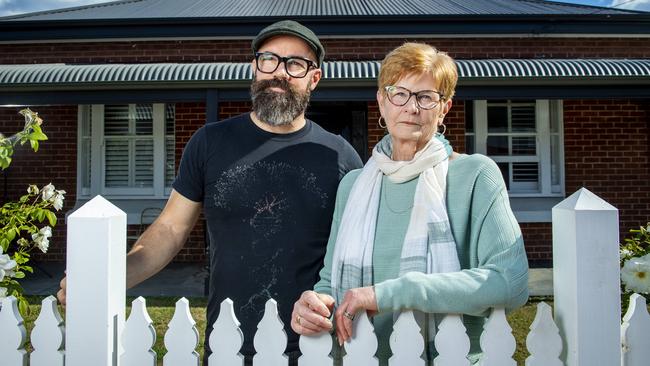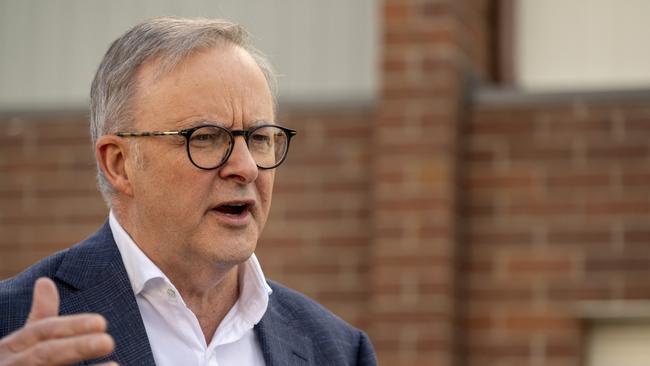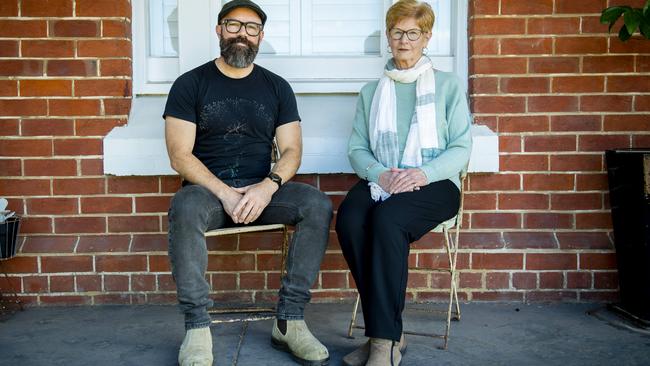Federal budget 2024: SA’s Albanese family demands cost of living relief
They may share a surname with the PM, but Joan and Nathaniel Albanese are anything but sure bets to vote for an Anthony Albanese-led Labor. Here’s what they want fixed.
SA News
Don't miss out on the headlines from SA News. Followed categories will be added to My News.
Sharing a surname with the Prime Minister isn’t enough to secure Anthony Albanese support from South Aussies Nathaniel and Joan Albanese.
In fact, without noticeable changes to fix the cost of living crisis and generational preventive health measures, the mother and son pair will seriously consider becoming swing voters.
Nathaniel Albanese, 49, wants prevention to be funded in the federal budget, making a strong case that investing in early measures solves issues before they become problems.
Nathaniel shops around for his groceries including at Aldi and seeks out butchers to battle the rising grocery prices for his dual-income, child-free household.
The married, full-time worker whose West Hindmarsh home doubles as an office, earns about $150,000 a year.

He has a mortgage and an investment property bought more than 20 years ago which he considers his superannuation.
Because he works from home, his fuel bill is mostly for long drive holidays, and he doesn’t believe Australia has the infrastructure in place for electric vehicles.
His private health premiums have surged to about $500 a month – the first regular payment he would cut if the budget pinch tightened.
His home services of power, water and gas are what has hit his cost of living expenses the most.
“We’ve definitely seen double-digit increases over the last year or so,” he said.
“And just recently we had a water bill that also seems to have gone up.
“We moved from Victoria three years ago and I was surprised in South Australia how much more expensive the electricity is.
“It certainly seems to be having much more of an impact on our cost of living but that’s a state-based thing.”
Like most taxpayers feeling the pinch, Mr Albanese would like the federal government to take action on essential services such as energy and gas.
“Things that would directly impact me is services for the house,” he said.
“We use this as an office in addition to home, but there’s not a lot of kickback for us to work from home and get support for the increase in electricity and telecommunications.
“We sit within tax brackets where we don’t really get much back, don’t get childcare support, don’t have any disability support or pensioner support, we don’t have any other kind of struggles so we’ve always felt that either as single people or dual-income couples like us, without children in particular and in our age bracket, there have really been no kickbacks for us.

“What I would like to see in the federal budget is relief for services, I would like to see relief for people who are struggling.
“The other thing is a continued focus on health … more investment in science and technology.”
He said greater investment in pathology, particularly genomic and genetic medicine, could relieve pressures on the health system.
“If I could summarise what I would like to see in the budget in a word, it would be prevention: teaching kids the right way to behave so we don’t have domestic violence issues, prevention of diseases so we can detect them sooner, investment in people being healthy,” he said.
“I would personally love to see them have something in the budget that says people who go to the gym and can prove they go to the gym, or do something to make themselves healthy, get a financial kickback.”

Mother-of-three and retiree Joan Albanese is concerned about the impact to her budget when the $125 concession under the Energy Bill Relief Fund ends next quarter.
It is a cost she will have to absorb into her income which is the pension and superannuation.
“When that finishes after next month, that will have a big impact on some people I think,” she said.
“It’s $125 a quarter and it makes a big difference.”
She tops up on petrol when the prices are low to avoid substantial hits to her budget, and does her grocery shopping in one go rather than shop around.
Her grocery bill has increased about 25 per cent in the past year.
“There is a large increase in cost of living but I don’t know that it’s all the government’s fault,” she said.
“Food is the one expense you really can’t avoid because you have to eat.
“I think they’re probably doing as much as they can with the aged care pension – they do increase it each March and September, a very small increase.
“I’m not sure that it keeps up with the price index.
“I don’t have mortgage payments but I do still have the maintenance and rates and that kind of thing, so you don’t get out of it freely – but you do get a bit of help.”
She would like the government to buy back electricity and charge “everybody a reasonable price”.
“And I would like them to sell their gas (overseas) for an increased price so we get ours at a discounted price,” she said, to which Nathaniel replied that was policy, not budget.
“But it’s still government and if the government wants to get in again, if they do something in the budget, then we might vote them in so they can make a policy.”
They both agreed urgent funding was needed for mental health.





